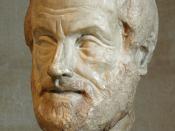Ethical Awareness Research PaperEthics can be a sensitive subject matter depending on whose ethical perspective one is attempting to relate to. Some individuals base their ethical perspective on a person's character or virtue, while others may use obligation/deontology, results/utilitarianism, or equity/relativism perspectives to rationalize behaviors. This paper looks at the writers own ethical perspective as well as the other three perspectives mentioned above in an effort to explain the variation in individual decision making.
Character/VirtueTaking a look at my own ethical perspective sheds light on the character/virtue perspective. This thought process focuses more on "what it is good to be, rather than what it is good to do. (Ethical awareness inventory, 2003, p. 1)" According to the Ethical awareness inventory, this perspective and those that utilize it believe that ethics should focus on ways to help people achieve moral excellence. This ethical style tends to look beyond the actions of an individual in order to determine the nature of their character for uprightness and integrity including traits such as honor, justice, and benevolence due to the belief that character is more important than actions.
(Ethical awareness inventory, 2003, p. 1) This perspective closely mirrors the virtue theory of Aristotle and Plato which is said to have a downside of being "culpable in their intentions and actions by being "thoughtless, insensitive, reckless, impulsive, shortsighted, and by assuming that what suits them will suit everyone instead of taking a more objective viewpoint. (Weiss, 2006, pp. 130)"Obligation/deontologyUnlike the character/virtue perspective which cares little for rules, the obligation/deontology perspective weighs rules above all else. "Regardless of consequences, this approach is based on universal principles, such as justice, rights, fairness, honesty, and respect. (Weiss, 2006, pp. 124)" Simply put, in the event that breaking the rules meant changing the lives of millions of...


